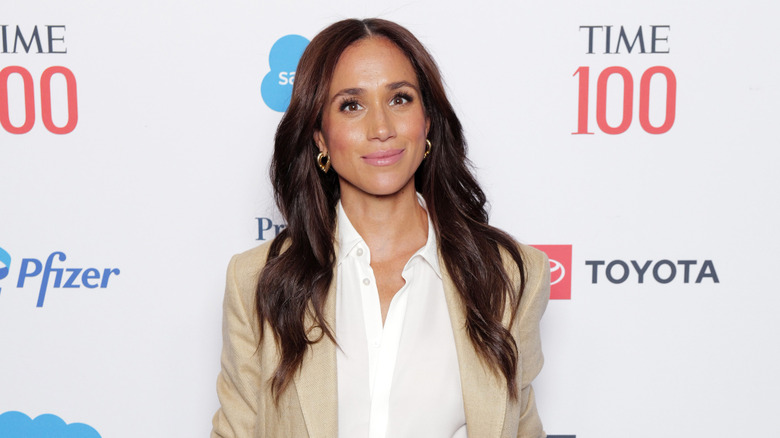In a new CBS Sunday Morning interview with journalist Jane Pauley, Meghan Markle and Prince Harry spoke openly about mental health, social media, and their ongoing advocacy work. This marked their first joint televised interview since 2021. Meghan’s candid remarks about her past struggles with mental health highlighted the importance of open dialogue, while the couple also used the platform to bring attention to the risks of online harms for young people.
Mental health continues to be a central theme of the Duke and Duchess of Sussex’s philanthropic work. Their recent discussion not only shed light on their personal journey but also emphasized their commitment to creating safer digital spaces and reducing stigma around seeking help.
Meghan Markle on Mental Health
During the interview, Meghan revisited one of the most difficult moments of her life. She spoke candidly about experiencing mental health struggles in the past, including having suicidal thoughts. By sharing her personal story, Meghan explained that her goal is to encourage others to talk openly about their challenges and to seek support without fear of stigma.
Her honesty aligns with her broader advocacy for mental health awareness. Meghan explained that by talking about her own experiences, she hopes to prevent others from feeling isolated or unsupported. Mental health experts widely agree that sharing stories can help normalize conversations, break down barriers, and encourage more people to seek professional care when needed.

Prince Harry and Meghan’s Advocacy for Safer Online Spaces
Beyond their personal reflections, Meghan and Harry focused on one of their key initiatives: addressing the dangers of online bullying and social media-related harms, especially for children and teenagers.
Through their nonprofit organization, the Archewell Foundation, the couple has worked closely with families who have been directly affected by the negative impacts of online platforms. Their advocacy highlights the urgent need for improved online safety measures, greater accountability from tech companies, and more resources for parents navigating the digital world.
Research from institutions such as the U.S. Centers for Disease Control and Prevention (CDC) and the Pew Research Center underscores the couple’s concerns. Studies show a significant increase in reports of anxiety, depression, and suicidal ideation among young people in connection with online harassment and excessive screen use.
Harry and Meghan have positioned their work as part of a larger movement to ensure technology serves young people in positive, supportive ways rather than exposing them to harmful content.
Revisiting the 2021 Oprah Winfrey Interview
Meghan’s latest remarks also connected to her widely publicized 2021 interview with Oprah Winfrey, where she first revealed the depth of her struggles with mental health while a working member of the Royal Family. At that time, Meghan said she sought support but did not receive it, which left her feeling vulnerable and isolated.
The CBS conversation allowed her to reflect on how far she has come since then, both personally and in her advocacy journey. Meghan emphasized that talking openly about difficult experiences is part of her healing process and a way to empower others.
Mental health professionals consistently stress that visibility and openness from public figures can play a crucial role in reducing stigma. By discussing her experiences again in 2024, Meghan reinforced her commitment to being a voice for those who may feel unheard.

The Importance of Open Conversations on Mental Health
Health organizations, including the World Health Organization (WHO) and the National Alliance on Mental Illness (NAMI), emphasize that mental health is a vital component of overall well-being. Conditions like depression and anxiety affect hundreds of millions of people worldwide, and early intervention is key to improving outcomes.
Meghan’s decision to speak publicly contributes to breaking down the barriers that prevent individuals from accessing care. Her advocacy aligns with a growing cultural shift in which athletes, entertainers, and other public figures are increasingly transparent about their mental health challenges.
These conversations can help normalize therapy, counseling, and other forms of support, making it easier for everyday people to seek help without fear of judgment.

Social Media and the Well-Being of Young People
A major theme in the interview was the couple’s concern over the role of social media in children’s mental health. Studies, including those published by the American Psychological Association (APA), show that prolonged exposure to harmful online interactions can negatively affect young users’ self-esteem, mood, and social development.
Harry and Meghan’s advocacy calls for creating safer digital environments through better regulations, stronger parental tools, and increased awareness among young people about healthy online behaviors.
This mission reflects a broader international concern. Governments, educators, and advocacy groups worldwide are working on policy solutions and public campaigns to reduce online harms while ensuring children can benefit from the positive aspects of technology.

Archewell Foundation’s Role in Mental Health and Digital Safety
The Archewell Foundation, launched by Meghan and Harry in 2020, has become a hub for their charitable efforts, including mental health and online safety initiatives. The foundation collaborates with experts, nonprofits, and community organizations to promote compassion-driven projects.
Its work includes:
-
Supporting mental health programs for youth and parents
-
Advocating for safer digital platforms
-
Partnering with research organizations to study the impacts of online harms
-
Promoting community-based initiatives that encourage kindness and connection
Through Archewell, the couple continues to amplify their message on a global scale, leveraging their public platform to bring attention to issues that affect millions of families.
Why Meghan’s Story Matters
Meghan Markle’s willingness to share her mental health journey is significant not just because of her public profile but also because of the broader cultural influence of the British Royal Family. By discussing personal struggles openly, she has challenged longstanding taboos surrounding mental health, particularly within traditional institutions.
Her advocacy highlights the fact that mental health challenges can affect anyone, regardless of status, wealth, or background. This universality is what makes her message resonate so deeply with audiences worldwide.

Conclusion
The CBS Sunday Morning interview with Meghan Markle and Prince Harry reinforced their ongoing commitment to mental health awareness and digital safety. By candidly sharing her personal experiences, Meghan continues to play a vital role in reducing stigma and encouraging open dialogue. Together with Prince Harry, she is using her platform to highlight the urgent need for safer online spaces, especially for young people.
As conversations about mental health and digital well-being become increasingly important, the Sussexes’ advocacy stands as a reminder that addressing these issues requires both openness and action. Their foundation’s initiatives, combined with their willingness to speak personally, contribute to a growing global effort to protect and support mental health for individuals and families everywhere.

